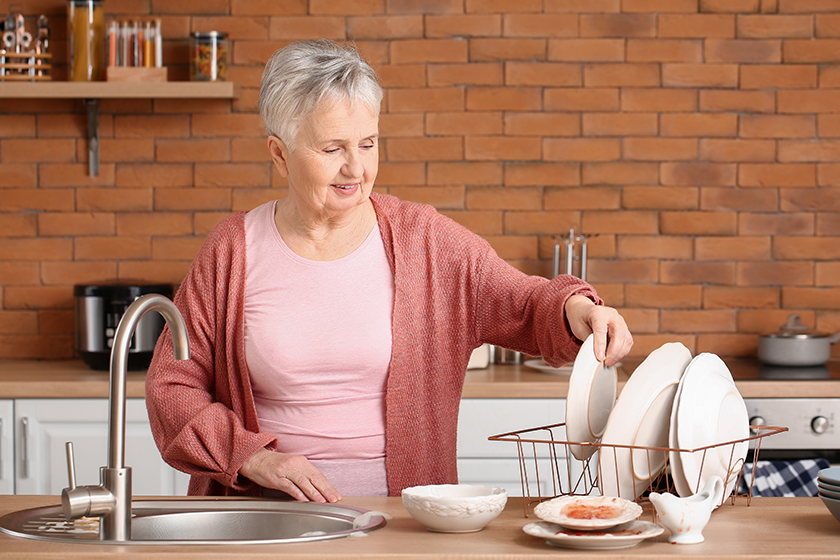Participating in household chores for seniors can be more beneficial than you might think. Whether it’s sweeping the floor or tending to a garden, these everyday tasks offer more than just a tidy home. They play a vital role in enhancing both mental and physical well-being.
For those considering Assisted Living options, understanding the advantages of engaging in household chores can significantly impact your loved one’s quality of life.
Physical Health Benefits of Household Chores
Engaging in household chores serves as a gentle form of exercise for seniors, increasing physical activity in a manageable way. Tasks such as sweeping, vacuuming, and gardening encourage movement, which helps maintain muscle strength and flexibility. For instance, sweeping the floor may appear simple, but it requires coordination and engages various muscle groups. Similarly, gardening activities like digging, planting, and watering not only boost cardiovascular health but also improve joint mobility. Research has shown that staying active through these tasks can lower the risk of chronic diseases and even contribute to a longer life.
Regularly doing household chores can help prevent chronic conditions. Studies show that staying physically active, even with tasks like heavy housework, is linked to better overall health. Older adults who stay active through these chores are less likely to develop health issues such as heart disease, diabetes, and osteoporosis. Additionally, these activities can reduce the risk of falls, which is a common concern for seniors, by improving their balance and coordination.
Cognitive Benefits of Household Chores
Household chores are not only physically engaging but also mentally stimulating. When seniors engage in these tasks, they involve planning, problem-solving, and memory recall, all of which are essential in keeping the brain active and sharp. Regular involvement in household tasks has been associated with improved cognitive functioning, particularly in areas like memory and attention. For example, organizing a pantry or planning meals can stimulate cognitive processes, which are beneficial in maintaining mental agility.
Additionally, household chores offer continuous mental stimulation, which is vital for cognitive health. Every task, from folding laundry to preparing a meal, requires a level of focus and attention that helps keep the mind sharp. This mental engagement is similar to activities like doing a crossword puzzle or reading a book, as it challenges different parts of the brain. By staying mentally active through chores, seniors can delay cognitive decline and keep their minds more adaptable to new challenges.
Emotional and Psychological Well-being
Completing household chores provides seniors with a tangible sense of accomplishment. This achievement is particularly significant as it fosters a sense of purpose and boosts self-esteem. The routine of completing daily tasks, no matter how small, can create a feeling of autonomy and control over one’s environment. This contributes to a more positive outlook on life, reinforcing a sense of self-worth and independence.
Engaging in household chores can also alleviate feelings of depression and anxiety. Being active and having a routine helps create a sense of normalcy and stability, which is essential for mental health. Studies have demonstrated that seniors who are more involved in daily activities, including housework, experience fewer depressive symptoms. During challenging times, such as the COVID-19 pandemic, staying engaged in these tasks proved to be a significant factor in maintaining mental health and well-being.
The repetitive nature of household chores can have a calming effect. When seniors focus on tasks like washing dishes or ironing clothes, it encourages mindfulness, allowing them to be present at the moment. This practice of mindfulness through chores can reduce stress and anxiety, promoting a peaceful and centered state of mind. For seniors, this routine can create a sense of security and help ground them in their day-to-day lives.
Social Engagement Through Household Chores
While household chores are often seen as solitary activities, they can foster social connections. Sharing tasks or asking for help with a chore can lead to meaningful interactions with family members, friends, or neighbors. This shared experience not only lightens the workload but also strengthens relationships and builds a sense of community. Engaging in these activities together can create opportunities for bonding and enhance emotional well-being.
For seniors who live with or are close to family members, participating in household chores can be a way to strengthen familial bonds. Whether it’s cooking a meal together or tidying up the living space, these activities create moments of connection and shared responsibility.
Fostering Wellness Through Household Chores
Household chores for seniors offer far-reaching benefits that extend beyond mere physical activity. They promote mental stimulation, emotional well-being, and social engagement, making them an essential part of a healthy lifestyle.
By encouraging your loved ones to participate in these everyday tasks, you can help them maintain their independence and enhance their overall quality of life.
If you’re considering Assisted Living options, we believe in creating an environment where engagement and well-being are prioritized. Our community encourages residents to participate in household activities that promote health and happiness.
Contact us today and discover how we can help your loved ones thrive in a supportive and active setting.







